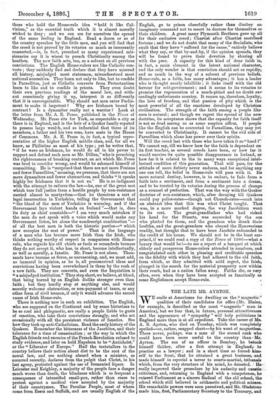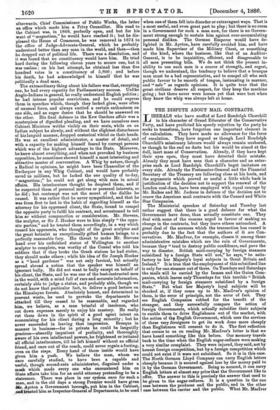THE LATE MR. AYRTON.
WE smile at Americans for dwelling on the." magnetic." qualities of their candidates for office (Mr. Blaine, for example, is described as the most " magnetic " man in America), but we fear that, in future, personal attractiveness and the appearance of " sympathy " will help politicians in England more than is at all expedient. Take the career of Mr% A. S. Ayrton, who died on Tuesday, which was completely spoiled—or, rather, snapped short—by his want of magnetism). There never, perhaps, was a man of the second rank who could have been more useful to the country than-Mr. Ayrton. The son of an officer in Bombay, he betook himself thither, after a first attempt in England to .practise as a lawyer ; and in a short time so forced,- self to the front, that he obtained a great business, -and made himself in especial a terror to courts-martial, tribunals which, from the very structure of his mind, he detested. ' He really improved their procedure by his audacity and cauatie criticisms and, returning to England with a competence, he entered Parliament as a sincere Radical of the old school, the school which still believed in arithmetic and political adenoe. His remarkable powers were soon perceived, and Mr. Gladstone made him, first, Parliamentary Secretary to the Treasury, and afterwards, Chief Commissioner of Public Works, the latter an office which made him a Privy Councillor. His road to the Cabinet was, in 1868, perfectly open, and but for his want of "magnetism," he would have reached it ; but he dis- pleased the House of Commons, he was removed in 1874 to the office of Judge-Advocate-General, which he probably understood better than any man in the world, and then—then he dropped out of political life. There was a dissolution, and it was found that no constituency would have him. He tried hard during the following eleven years to secure one, but it was useless ; on his last attempt, he obtained less than five hundred votes in a constituency of 5,800; and before his death, he had acknowledged to himself that he was politically a dead man.
The extraordinary thing about his failure was that, excepting one, he had every capacity for Parliamentary success. Unlike Anglo-Indians in general, he really understood English politics ; he had intense popular convictions, and he could express them in speeches which, though they lacked glow, were often of unusual force, and always excited a certain enthusiasm on one side, and an eager desire that he should be answered on the other. His final defence in the Kew Gardens affair was a masterpiece of dignified pleading, and we have ourselves seen Cabinet Ministers writhe visibly on their seats, while on an Indian subject he slowly, and without the slightest disturbance of his languid manner, dropped oratorical vitriol on their heads.
He was an excellent administrator, a master of detail, and with a capacity for making himself feared by corrupt persons which was of the highest advantage to the State. Moreover, he knew almost everything, and when not provoked by business opposition, he sometimes showed himself a most interesting and attractive master of conversation. A Whig by nature, though a Radical in opinions, he might have been Chancellor of the Exchequer in any Whig Cabinet, and would have probably saved us millions, but he lacked the one quality of to-day, "magnetism ;" he could not get along with men in actual affairs. His interlocutors thought he despised them, and if he suspected them of personal motives or personal interests, so he did ; but contempt was not the secret of the dislike he roused. It was rather that he never sympathised, and that he was from first to last in the habit of regarding himself as the attorney for his oppressed client, the State, bound to compel the opposite party to fulfil his contract, and accustomed to tell him so without compunction or consideration. Mr. Stevens, the sculptor, or Sir J. Hooker were to him simply "the oppo- site parties," and he treated them accordingly, in a way which roused his opponents, who thought of the great sculptor and the great botanist as exceptionally gifted human beings, to a perfectly reasonable fury. His threat to make Mr. Stevens hand over his unfinished statue of Wellington to another sculptor to complete, was worthy of the Consul who told his soldiers that if they broke the Greek statues he had stolen, they should make others ; while his idea of Sir Joseph Hooker as a "head gardener" was not only farcical, but actually spread abroad a notion that the speaker was himself an ignorant bully. He did not want to bully except on behalf of his client, the State. and he was one of the best-instructed men in the world, with a mind full of rare and accurate information, certainly able to judge a statue, and probably able, though we do not know that particular fact, to deliver a good lecture on the Himalayan forests. Absolutely honest, and determined to prevent waste, he used to provoke the departments he attacked till they ceased to be reasonable, and regarded him, we believe, as a man brimful of insolence, who cut down expenses merely to enjoy his mastery. He really cut them down in the spirit of a good agent intent on economising for his client during a long minority ; but he never succeeded in leaving that impression. Brusque in manner in business—for in private he could be languidly gracious—absurdly impatient of prolixity, and thoroughly aware of his own intellectual powers, he frightened or irritated all official interlocutors, till he left himself without an official friend, and once out of the coach, could never regain a footing, even on the steps. Every hand of those inside would have given him a push. We believe the man, whom we once carefully studied, to have been a capable and useful, though second-rate administrator, disguised under a mask which made every one who encountered him on State affairs take him for an acrid attorney pretending to be a statesman. There was place in our system once for such a man, and in the old days a strong Premier would have given Mr. Ayrton a Government borough, put him in the Cabinet, „anitrusted him as Inspector-General of Departments, to be used when one of them fell into disorder or extravagant ways. That is a most useful, and even great part to play ; but there is no room in a Government for such a man now, for there is no Govern- ment strong enough to sustain him against ever-accumulating personal dislikes. The German Emperor would have de- lighted in Mr. Ayrton, have carefully avoided him, and have made him Supervisor of the Military Chest, or something of the kind, where the business, like that of an Auditor- General, is to be inquisitive, efficient, and disagreeable to all men presenting bills. We do not think the present in- ability to use such men is a source of strength, and regret, though we understand, the tendency to believe that a brusque man must be a bad representative, and to compel all who seek public favour to be smooth of tongue, insinuating in manner, and " safe " as regards opinions. It is quite true that the great civilians deserve all respect, for they keep the machine going ; but there never were horses yet that were best when they knew the whip was always left at home.







































 Previous page
Previous page